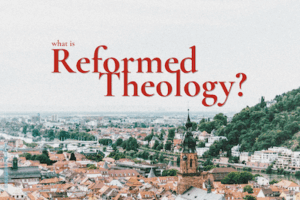“Arminius’ views clearly belong to the category of those of Karg and Piscator: he not only attributes no soteriological purpose to Christ’s active obedience, he also restricts the purpose of the nominally passive aspects of Christ’s obedience in life and ministry to . . . Continue reading →
synergism
What Is Reformed Theology? (Part 1)
Reformed theology has enjoyed a renaissance of sorts for about thirty years. A renaissance is literally a rebirth or, more broadly, a renewal. In order for there to be a renewal, however, there had to be a classical, defining period of Reformed . . . Continue reading →
What Is Reformed Theology? (Part 2)
Unfortunately, when most people think of Reformed theology, they think of the doctrine of predestination. The reasons for this have more to do with the critics of Reformed theology than with what the Reformed themselves confess. Indeed, one of the great weaknesses of the modern Reformed renaissance is that it tends to re-define Reformed theology almost entirely in terms of the doctrine of divine sovereignty. Continue reading →
What Is Reformed Theology? (Part 3)
The Reformed confession is a catholic confession—that is, it is rooted in the Scriptures as interpreted by the church and confessed in the ancient, ecumenical creeds, but it is also a Reformation confession. Where the medieval church taught justification and salvation by . . . Continue reading →
What Is Reformed Theology? (Part 4)
Since salvation belongs to God, it is he who grants us new life and true faith. As a consequence of the fall, all of Adam’s children (Rom 5:12–21) are, as Paul says, “dead in sins and trespasses” (Eph 2:1). The good news can be expressed in two words: “But God . . .” Continue reading →
What Is Reformed Theology? (Part 5)
Since salvation belongs to God, it is he who grants us new life and true faith. As a consequence of the fall, all of Adam’s children (Rom 5:12–21) are, as Paul says, “dead in sins and trespasses” (Eph 2:1). The good news can be expressed in two words: “But God . . .” Continue reading →
What Is Reformed Theology? (Part 6)
There are Christian traditions that speak of Jesus’ death as primarily an example and there are those that speak exclusively of Jesus’ death relative to his victory over death but the most basic choice we must make is whether he died as . . . Continue reading →
What Is Reformed Theology? (Part 7)
There was a time when most of the world was outside the promises and people of God (Eph 2:12). From the formation of the national Israelite church under Moses, the world was, from the biblical perspective, divided between Jews and Gentiles. The temporary ceremonial and judicial laws, which were fulfilled by Christ and which expired with and were abrogated by his death (Acts 10 [all]), taught that not only certain foods were unclean (and illegal) and defiling but also that whole people groups were also unclean and defiling. Since the Lord instituted the sacrament of circumcision under Abraham (Gen 17:9–14) the Jewish church had been literally and figuratively cut off from the surrounding Gentile religions. Continue reading →
